[vc_row][vc_column width=”1/2″][vc_column_text]
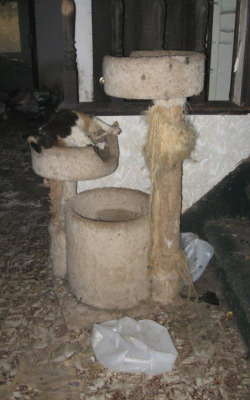
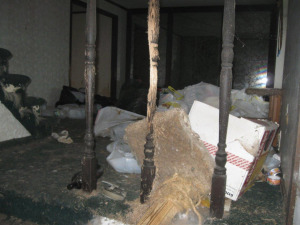
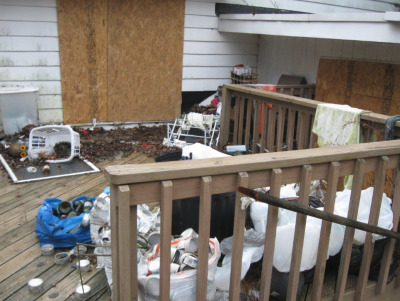
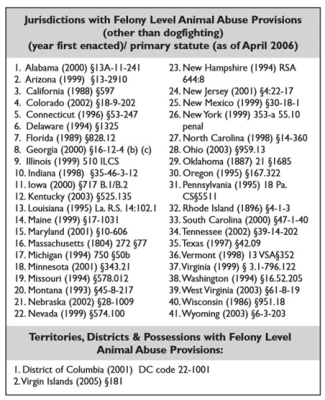
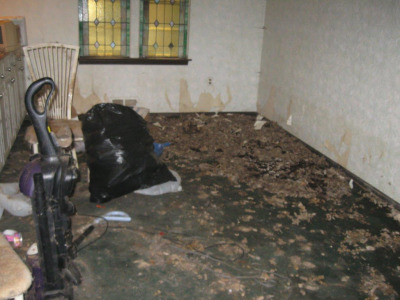
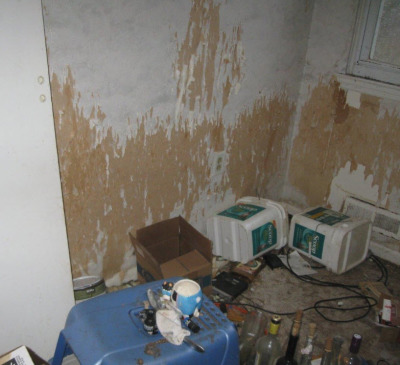
[/vc_column_text][/vc_column][vc_column width=”1/2″][vc_column_text]
Animal Hoarding Cleanup: New Jersey
In our seven year history of providing property damage restoration services throughout the greater Philadelphia and Southern New Jersey region we have often been called out to assist the families of hoarders with the crisis of cleanup.[/vc_column_text][vc_column_text]But recently, we were called out to the home of a hoarder that also hoarded animals, in this case cats. We don’t know exactly how many live cats were part of this hoard – they were removed before we got there.
But we did find the horror of three dead cats when we entered the home.
This case highlights the intense emotional conflict we face when doing the work of clean up: the compassion we feel for the suffering of the hoarder, and the compassion we have for the animals that have been suffering under the hoarder’s care. Everyone suffers with animal hoarding—the animals, the hoarder, and those who love the hoarder.
Our hoarding clean up story is not that unusual. The actual statistics are staggering:
• Every year 3,500 animal hoarders come to the attention of authorities.
• At least 250,000 animals are affected each year.
• 80% of animal hoarders have diseased, dying, or dead animals on the premises.
• Up to 40 percent of object hoarders also hoard animals.
[/vc_column_text][vc_column_text]Stories of animal hoarding abound, like the one at the Jersey shore last year.
That story, about an SPCA volunteer who was hoarding both live and dead birds in her mother’s home, and others like it, often repulse us – not just for the ”yuch” factor with the filth of the hoard, but because we identify with the suffering of the animals that are being hoarded.
Many of us ask, “How can this happen? Aren’t there laws against animal cruelty?” And we wonder why and how family members as well as state and local officials don’t prevent it.
Understanding how a person can go from an “animal lover” to an “animal hoarder” who inflicts cruelty on animals through neglect is essential to correcting the problem.
And understanding how complex the problem is for treatment professionals as well as state and local agencies gives us clues about why this can happen and how hard it is to prevent.[/vc_column_text][vc_column_text]
How Can This Happen?
It starts when the animal hoarder imagines all the wonderful ways he or she will heal, love, and nurture their pets, while overlooking the burden of care that becomes overwhelming when they have too many of them.
Animal hoarders have every intention of caring for their pets when they get them, but because they have difficulty with organization, attention, perception, and focus, their good intentions are never realized. Because they have too many pets to care for, the mess and smell socially isolates and alienates the animal hoarder from family and friends. Relationships with human beings are simply abandoned in the crush of the hoard.
Aren’t there laws against animal cruelty?
The answer is a resounding “Yes!”
Overt cruelty to animals with an intention to cause them harm and suffering is a felony offense in most states. This includes behavior like torturing animals with the intent to inflict pain.
But the term “animal hoarding” is defined as “the compulsive need to collect and own animals for the sake of caring for them resulting in accidental or unintentional neglect or abuse.”
And, therein lies the problem . . .
[/vc_column_text][/vc_column][/vc_row][vc_row][vc_column][vc_column_text]The animal hoarder’s “good intentions” to rescue, heal, and protect are the motivation for collecting the hoard in the first place.
The hoarder of animals never intends to commit the crime of animal cruelty. They simply lack the perception that their behavior is causing their animals to suffer.
Oftentimes there are other mental disorders like depression, social anxiety, and dementia that co-exist (called “co-morbidity”) with the animal hoarding behaviors that complicate diagnosis and treatment.
Drs. Berry, Patronek, and Lockwood from the Tufts University Center for Animals and Public Policy are the founders of the Hoarding of Animals Research Consortium. Their extensive research on hoarders and has found that:
• 85% of animal hoarders are middle-aged, with most older than 60
• 50% live alone
• The animal hoarder exists in a state of complete denial, insisting the pets are fine and the house is ‘just a little messy.’
And that
• One hundred percent of hoarders relapse without treatment.
Like people who hoard objects, animal hoarders need professional help to overcome the behavior. Just removing the animals from a hoarder’s home doesn’t teach them new ways to manage their lives and prevent additional hoarding. Once discovered and confronted, an animal hoarder’s tendency is to move to a new location and start the horror all over again.
In addition, family and friends of the animal hoarder are often so furious and horrified by their behavior, they try to berate the hoarder into changing. So the children and friends will also need the help of a therapist to learn to how to be helpful, rather than hammer the hoarder with confrontation.
Animal hoarding cleanup by itself won’t help.
What you can do to help:
In previous posts about help for hoarders we have listed the professionals in the Greater Philadelphia and Southern New Jersey region who specialize in treatment for hoarding.
Before confronting the animal hoarder, please consider consulting one of these professionals. They can help you plan a compassionate intervention based on the techniques of Cognitive Behavioral Therapy – the only type of therapy proven to be effective in changing the hoarding behavior.
• If you suspect someone in the Greater Philadelphia area is an animal hoarder, contact the Pennsylvania SPCA: http://www.pspca.org/2013/03/pennsylvania-spca-recent-animal-hoarding-cases-highlight-need-for-inter-agency-cooperation/
• If you suspect someone in the New Jersey area is an animal hoarder, contact the New Jersey Department of Health: http://www.state.nj.us/health/animalwelfare/spca.shtml
Or the New Jersey Society to Prevent Cruelty to Animals (NJSPCA): 800-582-5979, http://www.njspca.org/
For Legal Information about animal hoarding in either Pennsylvania or New Jersey contact:
https://www.animallaw.info/statutes/us/pennsylvania
https://www.animallaw.info/statutes/us/new-jersey
And, as always, if you have questions about object or animal hoarding clean up services in the Greater Philadelphia and Southern New Jersey region please give us a call at 877-750-7876.
[/vc_column_text][/vc_column][/vc_row]

Pingback: Animal Hoarding: February Roundup -
Pingback: Animal Hoarding: January Round-up -